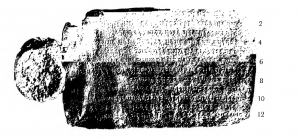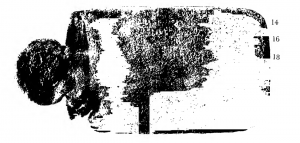

1-4) [The year…], (the month of) Phalguna, (and) the day 10 (and) (5?), while paramadaivata paramabhaṭṭārakamahārājādhirāja, the prosperous Budhagupta is the lord of the earth—while the Koṭivarṣa district was running on the enjoyment (of the rule) of mahārāja Jayadatta, (who is) uparika over the Puṇḍravardhana province, being selected by His (Majesty’s) feet—and while āyuktaka Bhaṇḍaka, appointed by him (Jayadatta), was administering the court of the district town as the chief of the nagara-śreṣṭhī Ribhupāla, the sārtthavāha Vasumitra, the prathama-kulika Varadatta and the prathama-kāyastha Virprapāla;
5-9) Whereas this śreṣṭhīn Ribhupāla has applied, “In the village of Ḍoṅgā were formerly given by me, hoping for eternal benefit, four kulyavāpas (of land) not yielding (any revenue) to Kokāmukha-svāmin , and seven kulyavāpas to Śvetavarāha-svāmin, on the tablehand of the Himālayas, for the augmentation of spiritual merit. Now, on land in the neighbourhood of that cultivable field I desire to erect two shrines, with the subtile Earth-bowing (in front), and their two store-rooms, for these primeval (gods), Kokāmukha-svāmin and Śvetavarāha-svāmin. Deign to make over six kulyavāpasof building site in accordance with the prevalent custom (of sale).”
9-15) Whereas it has been determined through the ascertainment of the record keepers Viṣṇu-Datta, Vijaya-Nandin and Sthāṇu-Nandin and that it is a fact that by him were given eleven kulyavāpas of cultivable field, not yielding (any revenue), to the same Kokāmukha-svāmin and Śvetavarāha-svāmin on the tablestand of the Himālayas—and whereas for the erection here of the shrines and store-houses in connection with them (the gods) he has properly applied for building-site being given him on land in the neighbourhood of the cultivable field, according to the prevailing custom of sale, namely, three dīnāres for one kulyavāpa ….. on the east of the lotus-pool ……… to the south (of the cultivable field previously given by) Ribhupāla, were granted (six kulyavāpas).
15) So these (kulyavāpas) should be respected by administrators in time to come. It has been said by Vyāsa:
Verse 1) He, who takes away land given by himself or by others, having become a worm in excreta, rots with his forefathers.
Verse 2) Carefully preserve the land that has already been given to the twice-born (Brāhmaṇas), Yudhiṣṭhira, the best of land owners. Preservation is more meritorious than grant (of land).
Verse 3) And land has been granted, again and again, by many kings. (But) the fruit of that (land) belongs to whosoever possesses the land at that time.